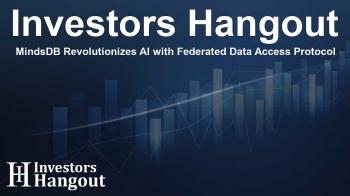MindsDB Revolutionizes AI with Federated Data Access Protocol

MindsDB Revolutionizes AI with Federated Data Access Protocol
MindsDB, a pioneer in AI data integration, has made strides by supporting the Model Context Protocol (MCP). This advancement positions the company as a central hub for AI data, facilitating a seamless connection between AI models and enterprise data. By implementing MCP, MindsDB is significantly simplifying the deployment of AI technologies within complex data environments.
Understanding the Model Context Protocol
The Model Context Protocol is an innovative open standard created by Anthropic. It serves as a universal means for AI applications to connect with various data sources and tools. Through this protocol, MindsDB empowers AI applications and agents to conduct federated queries across diverse databases, as if they are interacting with a single unified database. This ability is vital for enterprises looking to leverage AI effectively while avoiding the challenges associated with fragmented data sources.
Challenges in AI Data Connection
As AI adoption proliferates, organizations encounter significant hurdles in linking models to the right data under the best security measures and in a timely manner. Jorge Torres, CEO of MindsDB, points out that the complexity of data landscapes exacerbates this challenge. He emphasizes that MindsDB’s implementation of MCP offers a cohesive solution to eliminate data sprawl, which is often a barrier to innovation in the enterprise AI sphere.
Key Features of MindsDB’s MCP Implementation
MindsDB’s approach transcends basic compatibility with the Model Context Protocol by delivering a suite of features designed for enterprise needs:
- Federated Query Engine: This feature allows for seamless querying across multiple data sources while providing robust audit capabilities.
- Security Controls: The platform integrates smoothly with existing governance mechanisms to ensure data security.
- Advanced Data Operations: Users gain the ability to perform intricate workflows, including multi-source joins and natural language query transformations.
- Performance Optimization: MindsDB optimizes query execution at the data source and harnesses native integrations whenever MCP support might be lacking.
According to Sidney Rabsatt, Chief Product Officer of MindsDB, the platform acts as a vital data gateway. It simplifies complex operations by implementing MCP, thus freeing AI applications from the need to individually manage multiple data sources. This revolutionary system means standardized access patterns and minimizes unnecessary data movement while ensuring security and performance at an enterprise level.
Availability of MCP
The support for the Model Context Protocol is now available in both open-source and enterprise versions of MindsDB. The open-source edition provides essential MCP functionality intended for developers and smaller teams, while the enterprise version offers enhanced security, governance features, and dedicated support for extensive organizational deployments.
- The Open Source edition encompasses the essential MCP capabilities, enabling connections between models and data sources.
- For businesses requiring advanced features, the Enterprise edition offers improved security, governance, and monitoring.
A Glimpse into MindsDB
MindsDB functions as a unifying AI data hub that streamlines how enterprise data is accessed. The platform supports over 300 data connectors for structured and unstructured data coming from a multitude of sources, including databases and SaaS applications. By adopting the Model Context Protocol, organizations can overcome data access challenges, allowing them to innovate and scale their AI capabilities with confidence.
Frequently Asked Questions
What is the Model Context Protocol?
The Model Context Protocol is an open standard design for connecting AI applications with diverse data sources and tools, formulated to streamline access and integration.
How does MindsDB facilitate AI deployment?
MindsDB simplifies AI deployment by acting as a centralized hub that allows for seamless data queries across various sources through its implementation of the Model Context Protocol.
What are the key features of MindsDB’s platform?
MindsDB offers a federated query engine, security controls, advanced data operations, and performance optimization, designed to enhance enterprise-level data management and governance.
Is the Model Context Protocol available in both versions of MindsDB?
Yes, MCP support is available in both the open-source and enterprise editions, tailored to meet varying needs from developers to large organizations.
How does MindsDB ensure data security?
MindsDB integrates established security protocols within its platform, allowing for robust data governance and secure access while maintaining compliance across data operations.
About The Author
Contact Dylan Bailey privately here. Or send an email with ATTN: Dylan Bailey as the subject to contact@investorshangout.com.
About Investors Hangout
Investors Hangout is a leading online stock forum for financial discussion and learning, offering a wide range of free tools and resources. It draws in traders of all levels, who exchange market knowledge, investigate trading tactics, and keep an eye on industry developments in real time. Featuring financial articles, stock message boards, quotes, charts, company profiles, and live news updates. Through cooperative learning and a wealth of informational resources, it helps users from novices creating their first portfolios to experts honing their techniques. Join Investors Hangout today: https://investorshangout.com/
The content of this article is based on factual, publicly available information and does not represent legal, financial, or investment advice. Investors Hangout does not offer financial advice, and the author is not a licensed financial advisor. Consult a qualified advisor before making any financial or investment decisions based on this article. This article should not be considered advice to purchase, sell, or hold any securities or other investments. If any of the material provided here is inaccurate, please contact us for corrections.

